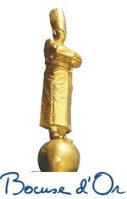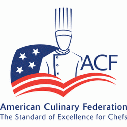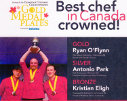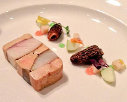Win Some, Lose Some
|
20th Edition
May 2013
|
In September of last year the Culinary Olympic was but a month away. I recalled at that time the experiences of my own Canada National Team as we readied for the final stretch in 1992. Therefor I decided that my September Editorial would focus on the events that unfolded prior to the departure of the Canadian Team.
Wishing to add perspective, I also contacted colleagues who had led other National Teams. They in turn added their memories of events that occurred to their teams as they also set about the challenges faced by all who set out on the road to the IKA.
Thereafter my January Editorial focused on the outcomes of the Olympics now past. This progression was a natural. In the first Editorial, we looked at the players and reviewed the injury list as they prepare to join in battle. When we wrote the last Editorial the final whistle has blown and the game was over and the Victors stood triumphant above all others.
Now here we are again in May. I was recently browsing through the Champchefs Hall of Fame and noticed how some National Teams continually came out at the top of the heap. This of itself is not surprising. It is a sporting tradition that championship teams breed champions. However I also noticed that these victories were cyclical and that the ‘top dog’ honors flip every decade or so. There is one exception and that is the Bocuse d’Or.
Let’s have a look at the major culinary competitions starting with the Bocuse d’Or.
The first Bocuse d’Or was hosted by Paul Bocuse in Lyons in 1987. The event has been held 14 times. France won the first and in February, they won the last. In all France has taken the Championship seven times and Norway has taken it 4 times. Now that’s a strangle hold! The Challenge Cup has never left Europe.
Turning to IKA Culinary Olympics. Neither my records nor my memory reach into the 1960’s or earlier . During this last forty-year period there have been ten IKA’s. In 1972 the Cup left Europe for the first time, captured by Japan. The cup has left Europe on two other occasions 1984 & 1992 both into Canada’s welcoming hands.
From 2000 through to these last Olympics in 2012 the Nordic Countries have controlled the podium. Sweden were Champions at 3 of the IKA’s and Norway grabbed one. In the ‘80’s and early ‘90’s Switzerland and Canada played tag deciding who would be King of the Castle. Germany broke up their run by capturing the crown in 1980.
Let’s review what has happened in Luxembourg at the World Cup. We see a totally different story unfold. The dominant country has been America who took three titles in a row through ’86 to ’94. Singapore was crowned in 1998 & 2010 to gain two championships. Interestingly America has yet to win the Culinary Olympics although the America Team led by Ferdinand Metz came a very close second in 1984.
What does all of this tell us? Why do these cyclical runs fizzle out? The chef is not alone with his efforts to cling to the throne and master consistency. Look for a moment at the world of Figure Skating. One of the all-time greats is Kurt Browning. He won the Worlds Individual title on 4 occasions yet he did not once capture gold at any Olympics.
I am reminded of an old man whom I knew back in the early ‘70’s. He was once a jockey. I could mostly find him at the Cheltenham Race Track. As I recall the big race was known as the ‘Gold Cup Chase’ and was generally held in March. It seemed that half of the population of Ireland had made the trip across the waters. The Cheltenham Gold Cup was a favorite race of the Irish punters. In those days I followed the ‘gee-gees’ and enjoyed a ‘flutter’ although I limited my betting to on-course only.
I would seek out this veteran of the turf around the paddock and we would discuss ‘the card’ and study the ‘form’. One afternoon I had made my picks and was departing to place my bet on the next race. My mentor beckoned me back and said ‘Son, take another look at the ‘going’ and ‘look at the horse’s form’. He then commented ‘remember that there are horse for courses’. He was referring to the day’s rain that had left the track wet and the going heavy. Taking a second look at my horse’s form, it was clear that its previous success had been gained when the going was dry and firm.
OK then, let us look at this theory of ‘horses for courses’. Does it also apply to ‘chefs for salons?’ Apparently not at the IKA. It would seem to hold true in Luxembourg for the World Culinary Cup where America is almost always favorite.
France and the Bocuse d’Or are comfortable stable mates. In Lyons, we see the beginning and the end of their endeavors. They will never win the Triple Crown. They do not like playing team games so they choose not to show at the IKA or at the Worlds. They will only race on their own track. The French are fillies not stallions.
So what is it that determines who the winners will be. There is no magic formula and no team is predestined. I will however identify three ingredients that are essential for success:
- Independence.
- Lots of Money.
- Backing by an efficient and experienced Organization of Professionals.
In most countries, the Church and the State are separate organizations. Neither one is beholden to the other. This must also be the relationship between National Teams and their National Associations. The Team Manager is appointed. Thereafter, he is in command. He is responsible for the Team selection and the Team finances. He will keep the National Association advised. He needs no further consents, permissions or directions.
I was Manager of the 1992 Canadian Team that won the IKA Olympics. That Canadian Team had one liaison only with the National Association. That was Hubert Scheck who was the National Culinary Chairman. Hubert was Captain of the 1984 Canadian National Team who in their turn also won the IKA Olympics.
It is difficult to give guidance on the financial aspects for funding a National Team. Each Country has its own special circumstances. Large amounts of money can be involved therefor there are also corresponding responsibilities. In preparation for the 1991 American Culinary Classic in Chicago and the 1992 Frankfurt IKA our Team raised over $325,000. The surplus after the competitions was $17,000. As a matter of due diligence, the Team appointed external auditors, Coopers & Lybrand. The auditor’s report was submitted to the National Association.
Do not assume that only 2nd or 3rd tier national teams are restricted by financial considerations. Let us take a look at the recent 2012 IKA. I have gone on record by declaring my pick for 1st place. I named Singapore. Why you might ask? Well, Singapore has been successful in Luxembourg having won twice most recently in 2010. This World Champion Team led by Ivan Yeo and Yen Koh was fresh off a big victory and in my opinion ready to dislodge the Nordic Countries from the podium at the IKA. What happened? They did not place! Why? They were a ‘no show’. Why was this? No Money. No sponsorship equals ‘no show’. If your Team is not based in Europe then you need lots of cash.
Let us examine the organizational aspects that prepare and deliver a Champion Team to the podium. The 1992 Canadian National Team harnessed the services of the best business minds in the Province of Alberta. We never called this group a committee they were known as “Les Amis des Chefs”. This gave them an elevated identity and bonded them to the team. Even ‘Big Shots’ enjoy a sense of belonging and can be motivated accordingly.
It is critical to have Government on side. The support of Ministers is important but the people that we corralled were the Deputy Ministers and the Assistant Deputy Ministers. These people know how to grind a project through to success. Our Public Relations Company was a subsidiary of North America’s largest such agencies. Our industry partners were not the Chairman of Corporations. They were the General Managers who know what it takes to make a business tick. These Mangers came from Agricultural Livestock and Commodities Groups; from an Airline and a Convention Centre. Team members never participated in these meetings. They had one job. Get ready to cook.
The structure of ‘Les Amis des Chefs’ assured that the team had a diversification of expertise available to it. Whereas Members of Les Amis des Chefs would have previously known of each other in many cases, it was the first time that they had worked together. And work and brain storm they did, sitting around the table hammering out strategies.
The dynamics were awesome. The outcome was rewarding.
It is no longer possible for a team of chefs to achieve the pinnacles of success unaided. They must be part of a well-financed machine. As with the IOC, the days of the amateur are long gone.
Maurice O'Flynn, Editor.
Archived Editorials
January 2013
September 2012
May 2012
January 2012
September 2011
May 2011
January 2011
October 2010
June 2010
February 2010
January 2010
July 2009
September 2009
July 2009
June 2009
December 2008
September 2008
Summer 2008
February 2008
|














